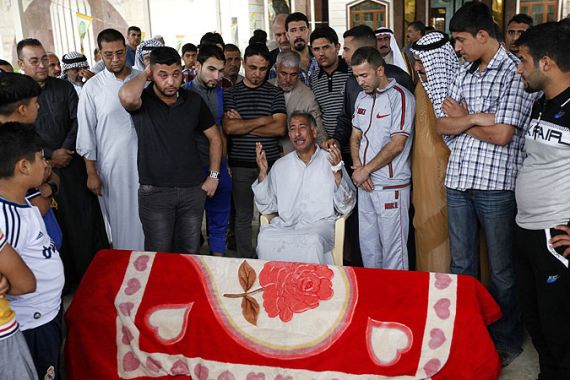Deaths in Baghdad mosque bomb attack
A roadside bomb kills six people near a Sunni mosque in al-Rashidiya district, north of Baghdad.

A roadside bomb has killed a Sunni cleric and five worshippers when they left a mosque in Baghdad after Friday prayers, police and medics said.
A further 31 people were wounded in Friday’s blast outside Al-Ghufran mosque in al-Rashidiya district of Baghdad, medics said. It was not clear who was behind the attack.
In Al-Amil in south Baghdad, a magnetic “sticky bomb” blast wounded a police captain, while a roadside explosion wounded three more police in Taji, north of the capital, sources said.
Elsewhere on Friday, nine police and four gunmen were also killed when mortar rounds were fired at checkpoints in fierce fighting that also left another seven police wounded, police and a doctor said.
Iraq has become increasingly volatile as the civil war in neighbouring Syria strains volatile relations between Sunnis and
Shia.
Sunnis have been protesting since December against the Shia-led government, which they accuse of marginalising them and monopolising power since US-led troops toppled Saddam Hussein in 2003.
The violence comes a day after the United Nations said April was the deadliest month for Iraq in almost five years.
A wave of unrest began on April 23 when security forces moved on Sunni anti-government protesters near the town of Hawijah in northern Iraq, sparking clashes that killed 53 people.
Dozens more died in the subsequent unrest, including in revenge attacks targeting security forces, raising fears of a return to the all-out sectarian conflict that claimed tens of thousands of lives from 2006 to 2008.
While violence has fallen from its peak during the sectarian conflict in 2006 and 2007, attacks are still common, and have killed more than 200 people each month so far this year.
Iraq is home to a number of insurgent groups including a local affiliate of al-Qaeda, which almost entirely controlled Anbar province until 2006 and is now believed to be regrouping there again.